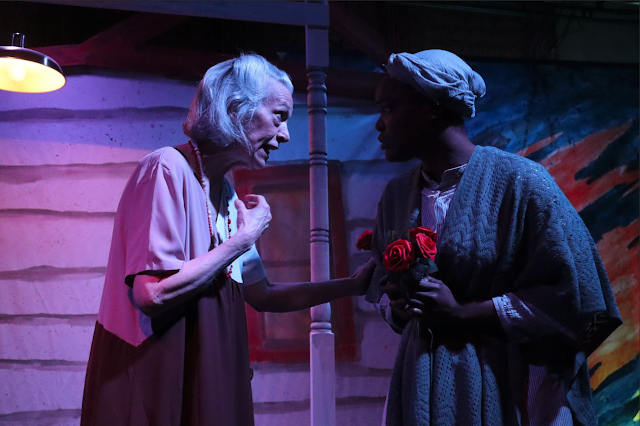American Blues: 5 Short Plays by Tennessee Williams
Written by Tennessee Williams
Directed by Jim Niesen
85 South Oxford St., Brooklyn, NYC
October 27-November 26, 2023
 |
| Shadenia Savid in Moony's Kids Don't Cry. Photo by Natasha Rotondaro |
In 1948, Tennessee Williams published
American Blues, a collection of five one-act plays, and a remarkable new production of this collection by Brooklyn's Irondale shows that these works have lost none of their power to both entertain and challenge audiences in the intervening three-quarters of a century. Comprising plays written in the decade between 1936 and 1946 -
Moony's Kids Don't Cry (1936);
The Dark Room (1939);
The Case of the Crushed Petunias (1941);
The Long Stay Cut Short, or, the Unsatisfactory Supper (1946); and
Ten Blocks on the Camino Real (1946) -
American Blues represents the second part of Irondale's American Century, the first installment of which drew on seven key American plays from 1921 to 1959 in order to create a non-linear musical exploring American culture, politics, and theater. Like that earlier production,
American Blues is free in celebration of Irondale's 40th anniversary year and in honor of its commitment to keeping theater accessible (to make a reservation, visit
https://www.irondale.org).
 |
| Terry Greiss and Vicky Milmore in The Dark Room. Photo by Natasha Rotondaro |
In Ten Blocks on the Camino Real, later expanded by Williams into the two-act Camino Real, among the questions that spill from a loudspeaker into the streets is one that might serve as a motto for American Blues as a whole: "Do you feel yourself to be spiritually unprepared for the age of exploding atoms?" While three of the plays in question were before the official start of America's atomic age, the spiritual enervation of life in a modern(izing) America provides one clear throughline in American Blues. Over the production's two-hour-and -forty-minute runtime, American modernity emerges as marked by anxieties about poverty, death (including from war and aging), and, most insistently, a desire, often but not always thwarted, for a less constrained and more fulfilling existence. Moony (Nolan Kennedy), for instance, in Moony's Kids Don't Cry, pictures himself manfully "chop[ping] a way through this world" with his lumberjack's axe rather than toiling under his condescending boss at the plant in a largely unsuccessful bid to support his wife, Jane (Shadenia Savid) and infant child. Moony's name itself suggests his status as a dissatisfied dreamer, although his phallic fantasy seems destined to remain merely that. And if Moony and Jane's poverty-ridden marital conflict contains a hint of A Streetcar Named Desire, The Dark Room–with its humorous sketch of impoverished Mrs. Pocciotti's (Vicky Gilmore) unseen daughter having taken to her unlit bedroom and, in doing so, having preserved a paradoxical freedom–similarly foreshadows the recurrence of the policing of women's sexuality as a theme in the playwright's work. That freedom is in danger, however, and the humor given an ominous touch, by the fact that social worker Mr. Morgan (Terry Greiss) comes to believe that the young woman needs to be taken away.  |
| Stephen Cross and Jacqueline Joncas in The Case of the Crushed Petunias. Photo by Natasha Rotondaro |
The Case of the Crushed Petunias is similarly funny while also offering a rare optimistic ending from Williams, in which the protagonist, Miss Dorothy Simple (Jacqueline Joncas) is not crushed for wanting more out of life (or if she is, we do not see it, allowing us to retain, with her, some hope). Death here is as much connected to the war to which it alludes as to bourgeois small-mindedness, represented by Mrs. Dull (Vicky Gilmore), while a mysterious man (Stephen Cross) attempts to sell shopkeeper Miss Simple on capital-l Life as an alternative path. The appreciation of life and its potential beauty and poetry receive much more cynical treatment in The Long Stay Cut Short, the title of which might be seen to refer as much to the life of near-centenarian Rose (Shadenia Savid) as it does to the desire of her relatives Archie Lee (Nolan Kennedy) and Baby Doll (Vicky Gilmore) to pawn her off on some other member of the family (that the character is named Rose, as was Williams's sister, lobotomized three years before this play was written, adds further layers to the depiction of a relative for whom no one wants to care). |
| Vicky Gilmore and Shadenia Savid in The Long Stay Cut Short. Photo by Natasha Rotondaro |
While there are immersive elements to the stagings of the first four plays - audiences change locations between each, for instance, guided by an ensemble member - each is performed before a painted backdrop, and there is a fairly clear division between audience and performance space. That division evaporates with the ending of
The Long Stay Cut Short, when a brilliantly staged transition, which might make you feel momentarily as if you have stumbled into
The Wizard of Oz, transports spectators to the hyperreality of the Camino Real. The brief ambiguity of whether or not Savid is still playing Rose at the end of this transition adds, fittingly, to the disorientation of moving into a world in which fictional and archetypal characters eke out a cash-strapped existence while awaiting their turn for the Street Cleaner (Nolan Kennedy) to cart their penniless corpse away for dissection in a laboratory. The pronunciation of Camino Real - CA-mino REal - gestures not only to the grubby
real underlying the type of fantasies offered by the proprietor (Michael David Gordon) of the Siete Mares hotel but also to the image of that reality as a kind of neverending dance. Kilroy (Stephen Cross), an American boxer who has lost the means to make a living, leaving him only a couple of tokens of his former success and a symbolically enlarged heart, is arguably the doomed center of this final play, which brings the audience both around the Irondale and into the action.
 |
| Jacqueline Joncas and Stephen Cross in Ten Blocks on the Camino Real. Photo by Natasha Rotondaro |
The staging in
Ten Blocks is superb, from the nightclub feel of the Siete Mares to the way in which the set for the establishment of the gypsy (Vicky Gilmore) and her daughter (Jacqueline Joncas) that Kilroy visits incorporates one of the building's gothic windows to the way in which at least one section converts Williams's stage directions into atmospheric dialogue. (It's interesting that the version of
Ten Blocks cited by John Guare in his introduction to the New Directions edition of the play as the best production in 47 years also dispensed with the traditional proscenium stage.) The live musical accompaniment employed throughout the show, featuring original music composed by Sam Day Harmet, becomes particularly integral in
Ten Blocks, and there are some visually striking moments, such as when a group of people materialize around Kilroy like a pack of predators when he takes out some money in the Siete Mares or when the Madrecita (Shadenia Savid) holds Kilroy in the attitude of the pietà.
 |
| Michael David Gordon in Ten Blocks on the Camino Real. Photo by Natasha Rotondaro |
Throughout
American Blues, the cast show off their range in a panoply of confident performances. Cross, for instance, makes an indelible impression as Kilroy in his golden-hearted weariness, while striking a very different, and very funny, almost whimsical figure as the man who tries to free Miss Simple (itself a great turn by Joncas - you can see the sparkle in her eyes as Simple embraces her new path) from her cage of petunias, including with an unexpected musical number. Kennedy is appropriately creepy as the street cleaner, while building and then testing our sympathy for Moony and Archie Lee; and Gilmore, to take a final example, is as funny as Mrs. Pocciotti or the gypsy as she is melancholically enthralling as Marguerite in
Ten Blocks, romantic partner of the equally well played Jacques (Terry Greiss).
 |
| Terry Greiss and Vicky Gilmore in Ten Blocks on the Camino Real. Photo by Natasha Rotondaro |
If the plays in
American Blues range from the naturalism of
Moony's Kids to the satirical magical realism of
Petunias to the poetic experimentalism of
Ten Blocks, one thing that is consistent is the particularly American cast of the zeitgeist and malaise that these works capture. Whether the emasculated Moony working under a Dutch boss or Kilroy, who was a "son" of American but is no longer by the end of the play, the question asked in
Ten Blocks echoes through many of these characters: "Can this be all?" The audience, though, however much
American Blues prompts them to ask this of their lives, will certainly not ask it of the show:
American Blues offers a special experience, one that feels when it is over as if you have been transported elsewhere and are only now returning, and one that will doubtless stick with you as this current American century paces uneasily onward.
-John R. Ziegler and Leah Richards









Comments
Post a Comment